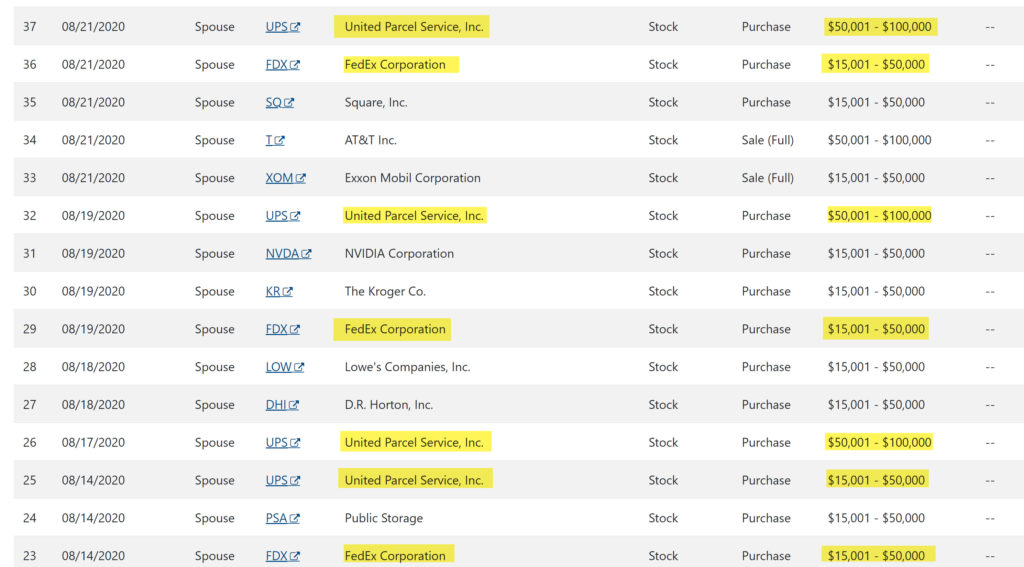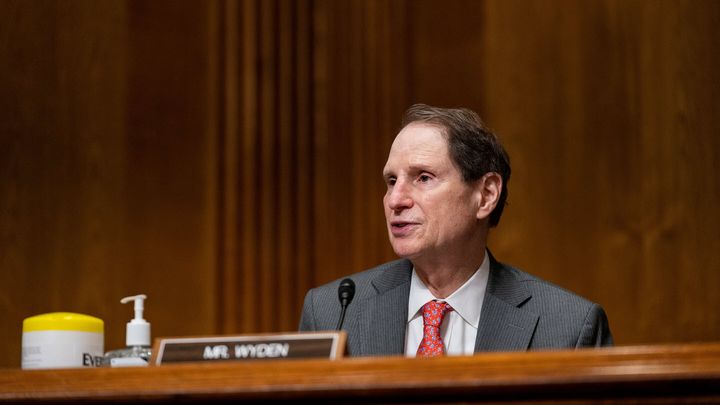Sen. Ron Wyden (D-Ore.) has spoken powerfully on saving the post office from Trump administration policies that are widely seen as attempts to undercut the agency in order to make voting by mail more difficult and to advance a decades-long attempt by Republicans to privatize mail delivery.
“Donald Trump has proved he is not going to stop scheming to advance his personal private interest by plotting to weaken the Postal Service,” Wyden said at a recent press event held in front of a post office in Eugene, Oregon. Together with Sen. Jeff Merkley (D-Ore.), Wyden has called the administration’s postal policies “diabolical.”
But as Wyden speaks out against the administration’s policy changes, a financial document he recently filed with the Senate shows that he is increasingly set up to benefit from investments in companies whose stock prices are likely to go up as a result of the United States Postal Service’s (USPS) struggles. Since August 14—weeks after the administration’s attacks on the postal service came to light—Wyden’s spouse, Nancy Bass Wyden, purchased as much as $500,000 worth of stock in USPS competitors United Parcel Services (UPS) and FedEx.
Prior to these recent purchases, neither Wyden owned any stock in these companies, Sludge’s review of financial documents found. Nancy Wyden’s FedEx stock holdings were worth between $45,003 and $150,000 as of August 29, while her UPS holdings were worth between $165,004 and $350,000.
Nancy Wyden is a co-owner of the Strand Bookstore in New York City, as well as the owner of Bass Book Trading and Bass Real Estate. Wyden’s most recent annual disclosure says she earned more than $1 million in income from Strand Bookstore in 2019 and as much $1 million for each of her other businesses. Nancy Bass Wyden’s combined assets were worth as much $9.1 million in 2019.

Wyden’s office did not respond to Sludge’s questions about these stock purchases.
Executive branch employees and their spouses are barred from owning stocks in companies that could create conflicts of interest with their official duties, but those rules do not apply to members of Congress.
Over the past several weeks, President Trump’s newly appointed postmaster general, Louis DeJoy, implemented several policy changes that have made it more difficult for the postal service to efficiently deliver the mail. These changes include the removal of mail sorting machines from facilities as well as requiring mail carriers to hold mail until the next day rather than using overtime hours. DeJoy, who with his wife Aldona Vos has disclosed up to $75.8 million in assets of USPS competitors, is considering several other changes that could slow mail delivery for after the November election, according to Washington Post. While DeJoy divested between $265,000 and $550,000 in UPS stock after being appointed postmaster general in June, he held on to up to $30 million in his former company XPO Logistics, a USPS contractor.
UPS and FedEx are both members of the American Legislative Exchange Council (ALEC), a conservative nonprofit that brings corporations together with Republican lawmakers to collaborate on legislation. ALEC’s typical recommendation for lawmakers is to privatize government services, and past reports have tied ALEC to the passage of a 2006 bill, the Postal Accountability and Enhancement Act, which required the postal service to pre-fund employees’ pensions and health benefits for 75 years into the future, contributing to the postal service’s financial troubles in subsequent years.
Mike Kiely, president of government affairs at UPS, has been a member of ALEC’s Private Enterprise Advisory Council since at least 2018, according to the Center for Media and Democracy. FedEx lobbyist Bill Primeaux is a member of the Executive Committee of ALEC’s Commerce, Insurance and Economic Development Task Force.
A Fix for Democracy – Government ethics experts call on elected officials to not trade individual corporate stocks. A bill proposed in Congress called the Ban Conflicted Trading Act would require senators, representatives, and senior staffers to divest corporate stocks, transfer them to a blind trust, or hold them throughout their time in office without making trades. The bill would also bar House members from serving on corporate boards. The House version of the bill has 9 co-sponsors, while the Senate version has 1 co-sponsor. No Republicans have co-sponsored the bill. Learn more🤔
Read more from Sludge:
As Markets Crashed, DeVos Sold Shares in Secretive Cayman Island Fund
EXPOSED: Reps Pass Bills That Benefit Their Own Private Companies



